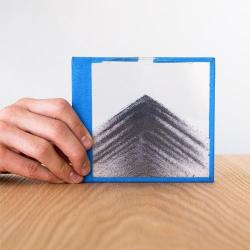Source Institutions
Source Institutions
Add to list Go to activity
Activity link broken? See if it's at the internet archive

In this geology activity, learners create a model using a mixture of salt and sand inside a CD case. When the case is tilted or inverted, the mixture dramatically sorts into a layered pattern. With this model, learners explore the angle of repose and Brazil Nut Effect to better understand how avalanches occur. Educators have the option of building the model with or without learners present. Includes a video demonstration of activity.
- Under 5 minutes
- 1 to 2 hours
- $5 - $10 per group of students
- Ages 11 - 18
- Activity, Demonstration, Model, Simulation
- English
Quick Guide
Materials List (per group of students)
- 2 CD jewel cases (regular thickness, not ultra-thin), with the inserts that normally hold the CD removed
- Masking tape
- Black sand (aka magnetic sand)
- Salt (ordinary table salt, not rock salt)
- Measuring spoon, 1 Tablespoon
- Paper or plastic cup, at least 3 ounces
- 4x6 card
- Sheet of newspaper, or paper towel
- Electric drill
- Drill bit, 1/4 inch
Subjects
-
Earth and Space Science
- Earth Processes
-
Earth Structure
- Rocks and Minerals
-
Mathematics
-
Algebra
- Patterns
- Geometry
-
Algebra
-
Physical Sciences
-
Motion and Forces
- Gravity
-
Structure and Properties of Matter
- Volume and Density
-
Motion and Forces
-
The Nature of Science
-
The Scientific Process
- Conducting Investigations
-
The Scientific Process
Informal Categories
- Model Building
- Nature and Environment
Audience
To use this activity, learners need to:
- see
- see color
- read
- touch
Learning styles supported:
- Involves hands-on or lab activities
Other
Components that are part of this resource:
This resource is part of:
Access Rights:
- Free access
By:
Rights:
- Creative Commons: Non-commercial Share Alike (by-nc-sa), Exploratorium, 2019
